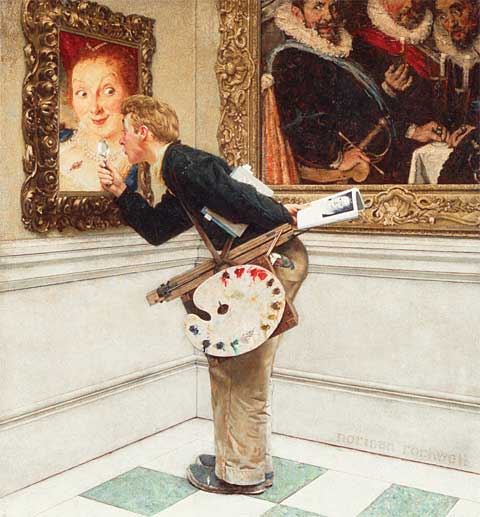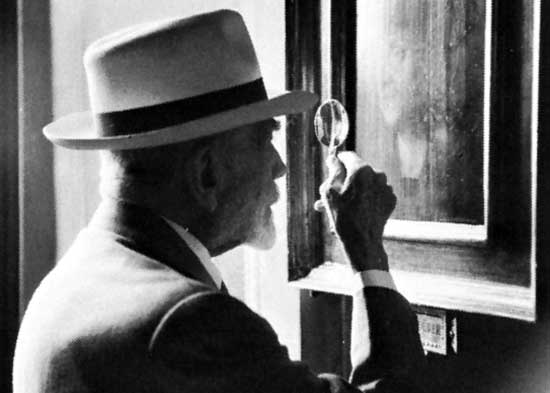There’s a fine line between critiquing art and enjoying it. Being overly critical can keep us from appreciating a film or book. But being un-critical makes us gullible to all kinds of  propaganda, and leads to the proliferation of mediocrity. So learning to balance art critique and art appreciation is important to the thoughtful consumer of pop culture. Nevertheless, that balance is notoriously prickly.
propaganda, and leads to the proliferation of mediocrity. So learning to balance art critique and art appreciation is important to the thoughtful consumer of pop culture. Nevertheless, that balance is notoriously prickly.
C.S. Lewis has an important take on this subject but one, I’m afraid, that doesn’t necessarily clarify the issue for me. To be a good writer, one must be a good reader. However, Lewis suggests that being a critic of books is a hindrance to good reading. From his Experiment in Criticism:
I doubt whether criticism is a proper exercise for boys and girls. A clever schoolboy’s natural reaction to his reading is expressed by parody or imitation. The necessary ingredient for all good reading is to get ourselves out of the way. We do not help young people by forcing them to keep expressing their opinions. Especially poisonous is the kind of teaching that encourages them to approach every literary work with suspicion. It springs from a very reasonable motive in a world full of sophistry and propaganda we want to protect the rising generation from being deceived, we want to forearm them against false sentiment and muddled thinking. Unfortunately, the very same habit that makes them impervious to the bad writing makes them impervious to the good.
This idea that the prerequisite “for all good reading is to get ourselves out of the way,” seems crucial to art appreciation. There’s a sense in which we must submit to the story before we can rightly critique it; we must approach a piece first, not as a judge, but as an open-minded observer. In fact, Lewis suggests that the worse thing we can do to a young  reader is to force them to “keep expressing their opinions.” He describes this as “especially poisonous.”
reader is to force them to “keep expressing their opinions.” He describes this as “especially poisonous.”
But this grates against many current academic trends. For instance, deconstructionism, as it concerns literary criticism, asserts that before we can fully interpret a piece we must impose certain preconceptions, understand the author’s “filter.” We can’t “get” Huck Finn until we understand Twain’s culture and politics. We can’t appreciate The Lord of the Rings until we grasp Tolkien’s Catholicism and his experience in the British Army. Yet, while understanding an author’s worldview and cultural milieu may illuminate aspects of her story, that approach ultimately militates against Lewis’ concept of submitting to the story. Doesn’t it?
But there’s another problem. Understanding the “rules” or nuances of a given medium are essential to appreciating that medium. It’s as we understand language and grammar, pacing and character development, that we can best appreciate a story. Studying musical theory can make one value the great composers. Learning about cinematography and camera work has not detracted from my love of film. In fact, it’s made it grow. But does this too fly in the face of Lewis’ assertion?
Perhaps, as Lewis says, we should not approach art, first, as a critic. Children need to read Narnia without the baggage of their parents’ “interpretations.” Nevertheless, weighing those interpretations and appreciating the critical elements of art, can be a crucial element to its enjoyment. All of which makes me wonder — Does art critique have to be an obstacle to art enjoyment?















Maybe it depends on the stage and the approach. I’ll look at it from my music training–I listened to everything growing up. You can’t help but develop an ear. You can’t help but notice what you like and don’t like (although I’d like to point out that what you like and don’t like is very different from critique).
It’s like the Olympics–the more I watch the gymnastics or diving or swimming, the more I see differences in form and style and technique (not claiming to be an expert by any means!).
Like you pointed out, learning the theory helps us better appreciate the beauty. So does critique. And it helped me be a better musician. Critique was done both to see what wasn’t up to par but also what exceeds it. It’s not always negative. It’s more about discernment. How can we strive toward beauty without understanding what is beauty, what is sentimentality, what is nihilism, etc.
We don’t have a problem critiquing theology. Why should we have a problem critiquing art? Aren’t they both involved with Truth?
I understand Lewis’ point of not being weighed down by parents’ interpretations (and looking at parents here as any one who has gone before). But shouldn’t we also seek the wisdom of those who have gone before? How can there be dialogue without some form of critique? (Again critique not meaning criticism–two very different things, although they can and do cross paths.)
Without any critique (and dialoguing with others and seeking the wisdom of others), we’re left with subjectivism. It would only be about how I feel, which is valid among other things and indeed a good starting point for enjoying art, but isn’t there more than how I feel about it? Can’t it be saying more than that?
“Does art critique have to be an obstacle to art enjoyment?”
Not necessarily, but yes for some. It’s interesting that usually the only “art” people critique is that which has been displayed, produced, performed, or published. The art done in private faces fewer critics or critiques. The standards for each of the arts is set by those who have “studied” the medium and arrived at certain conclusions and measurements. However, even in setting those standards, because of the very nature of creativity, those who have set them must admit to flexibility because of the variety in each form.
If we approach “art” with a critical eye based on concrete judgments acquired in our learning, we box up our reactions much like we often do to the ways of the Lord.
(I couldn’t follow my thoughts in the dark.) As far as critiquing and criticism, I would agree they are very close. Most people are incapable of rendering critique without meshing it with criticism to the point where it’s debatable if they’re inseparable.
And while learning about the crafting of music, painting, writing can enhance the experience of appreciating each, ultimately it still boils down to what we like, what moves us, in other words: what we feel about each.
I think the answer is in the middle (I say that a lot, don’t I?). When I was a kid, my boyish enthusiasm would make me gush over a lot of books, movies, etc. that I look back on now and say, “What was I thinking?” I once thought Return of the Jedi was the best Star Wars movie, for pete’s sake. So I wouldn’t necessarily agree that avoiding critical thought is ideal. But I think it’s also important not to lose the ability to get wrapped up or lost in art, and to let enthusiasm flow. So it’s a balancing act.
Also, you mention that we must get to know an author’s politics or lifestyle, etc., before we can truly understand his/her work. But isn’t important also to know where the critic is coming from before reading his/her thoughts and criticisms? None of us are completely objective.
Critique and theory puts boxes around the art. Then art can either be cultivated within that box, and ones tastes can get acclimated to the art in the box, or it can make the art stale. One might never realize that there is an entire field of possibilities outside of the box. I think theory can be fun, in and of itself, but theory is often only one point of view that a group of people have accepted to be worthy of note.
I think instead of being “observers” we could try to be “participants.” In that way we bring to the art what we have, we connect, and we take out more than we brought in.